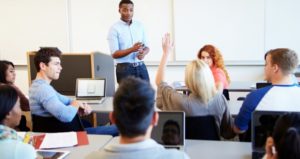
Is My Teaching Learner-Centered?
It’s hard to say—we have no definitive measures of learner-centeredness or even mutually agreed upon definitions. And yet, when we talk about it, there’s an assumption that we all understand the reference.
 My friend Linda recently gave me a beautifully illustrated children’s book that contains nothing but questions. It reminded me how good questions, like beams of light, cut through the fog and illuminate what was once obscured. And so, to help us further explore and understand what it means to be learner-centered, I’ve generated a set of questions. For the record, these questions were not empirically developed, and they haven’t been validated in any systematic way. However, they do reflect the characteristics regularly associated with learner-centered teaching.
My friend Linda recently gave me a beautifully illustrated children’s book that contains nothing but questions. It reminded me how good questions, like beams of light, cut through the fog and illuminate what was once obscured. And so, to help us further explore and understand what it means to be learner-centered, I’ve generated a set of questions. For the record, these questions were not empirically developed, and they haven’t been validated in any systematic way. However, they do reflect the characteristics regularly associated with learner-centered teaching.












